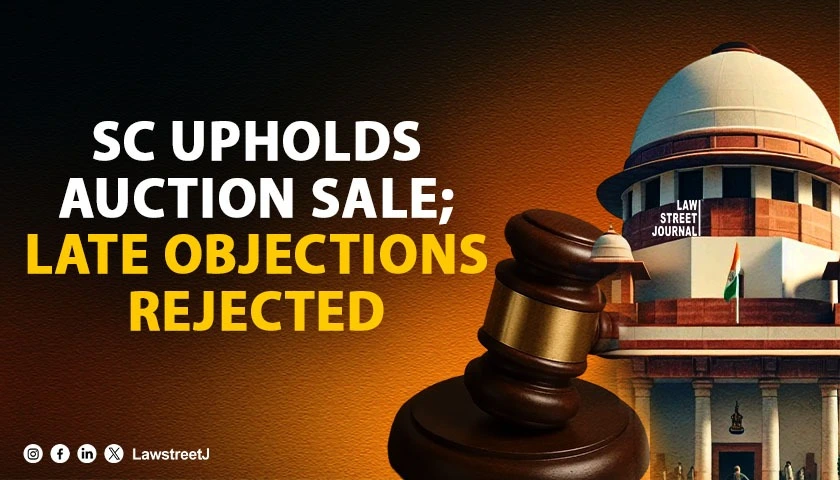New Delhi: The Supreme Court of India has reinforced the statutory bar under Order XXI Rule 90(3) of the Code of Civil Procedure, holding that judgment debtors who fail to raise objections before the sale proclamation cannot later challenge the auction sale on those grounds, even if the executing court did not examine certain procedural aspects.
Justice Sanjay Kumar, writing for a two-judge bench, emphasized that the 1976 amendment to the CPC introduced a crucial safeguard to prevent judgment debtors from delaying execution proceedings through belated objections.
The Court addressed Civil Appeal No. 8887 of 2011, filed by G.R. Selvaraj (deceased, represented through legal heirs) against K.J. Prakash Kumar and others, arising from an auction sale conducted in 2002 that the Madras High Court had set aside in 2009.
The case originated from a money decree for ₹3,75,000 obtained by Rasheeda Yasin against Komala Ammal and her son, K.J. Prakash Kumar. The execution petition sought the sale of a property admeasuring 2,120 sq. ft. in Chennai. After the first sale proclamation in 1999, with an upset price of ₹16,25,000, failed to attract bidders, several attempts were made with progressively reduced prices. The Court noted that the judgment debtor, K.J. Prakash Kumar, “appeared in person on 24.02.2000 and sought time on behalf of himself and Komala Ammal. They filed their counter on 22.03.2000.”
After multiple unsuccessful auctions, “the sale was finally held on 12.09.2002 and G.R. Selvaraj emerged successful at the knockdown price of ₹11,03,000.” The sale certificate was issued in January 2003 after the deposit was made and handed over to the decree holder.
Subsequently, the judgment debtors filed an application to set aside the sale, primarily alleging that the upset price had been reduced without notice to them. The executing court dismissed the application, and the appellate court confirmed this dismissal. However, the High Court set aside the sale, holding that the executing court had not examined whether the sale of only a portion of the property would have satisfied the decree.
Framing the legal issue, the Supreme Court observed:
“The issue in this appeal boils down to whether Order XXI Rule 90(3) CPC would have an overriding effect barring the judgment debtors from seeking invalidation of the sale when they could have—but did not—raise the ground that the entire property need not have been sold to satisfy the decree, before the last sale proclamation.”
The Court explained that the 1976 amendment substituted Order XXI Rule 90 CPC, with Rule 90(3) providing:
“No application to set aside a sale under this rule shall be entertained upon any ground which the applicant could have taken on or before the date on which the proclamation of sale was drawn up.”
Analysing precedents, the Court noted that Ambati Narasayya and Takkaseela Pedda Subba Reddi were decided prior to the insertion of Rule 90(3). Both had held that executing courts must examine whether sale of part of the property was sufficient. However, these judgments were rendered before the statutory bar was introduced.
The Court drew guidance from Desh Bandhu Gupta v. N.L. Anand, a post-amendment judgment, noting that Rule 90(3) operates as a form of caveat emptor:
“The judgment-debtor must be vigilant and watchful to vindicate pre-sale illegalities or material irregularities. He should not stand by to procrastinate the execution proceedings.”
The Court emphasized that before depriving a judgment debtor of the remedy under Order XXI Rule 90, it must be established that he had notice from the executing court and yet acquiesced by failing to act. If so, he is precluded from challenging the sale later.
It further clarified that the bar does not apply where judgment debtors were not given notice. However, “if the judgment debtor had been put on notice by the executing Court but had acquiesced, by taking no action before the date of the sale, he would be precluded from assailing its legality or correctness thereafter.”
Applying this principle, the Court held:
“We are convinced that not only were the judgment debtors in the present case put on notice at every stage during the reductions of the upset price, but they also participated to an extent and then chose to refrain from doing so.”
Rejecting the belated objection, the Court observed:
“Having failed to raise a material irregularity at the appropriate stage—i.e., with regard to the sale of part of the property being sufficient to satisfy the decree—they cannot now raise such a belated plea, nor place the burden on the executing court to set aside a sale held as far back as 2002.”
Criticizing the High Court, the Supreme Court noted that although it acknowledged the bar in Rule 90(3), it nevertheless ignored its effect by assuming that the executing court’s obligations under Rule 66(2)(a) operated independently of the judgment debtor’s own lapse.
Finally, the Court set aside the High Court judgment dated 10.02.2009 and restored the orders that upheld the auction sale, bringing closure to over two decades of litigation and vindicating the rights of the auction purchaser.
Case Title: G.R. Selvaraj (Dead), through LRs. v. K.J. Prakash Kumar & Ors.
Citation: 2025 INSC 1353











